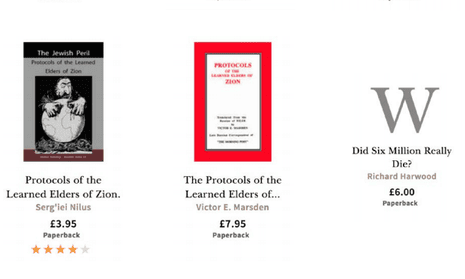Major booksellers have been accused of lending a veneer of respectability to antisemitic and neo-Nazi books by featuring them for sale on their websites.
The UK’s largest anti-racist group Hope Not Hate published an investigation into the number of far-right and antisemitic works available to buy on the websites of Waterstones, Foyles, WH Smith and Amazon. These included a manual containing bomb-making instructions, extreme antisemitic tracts venerated by Hitler and numerous works by Holocaust deniers. Many listings have since been removed from the retailers’ websites.
Joe Mulhall, senior researcher at Hope Not Hate, said that the books were discovered on sale during research on Nick Kollerstrom, an English author who is known for Holocaust denial.
“The first thing we could find on Google about him was on Waterstones, so we thought we would investigate to see what else we could find on mainstream seller websites and were shocked by how much we could find,” said Mulhall.
He said that while people have the right to write books others disagree with, companies should not profit from “extreme hate content” and making offensive books available to buy gave them “dangerous” legitimacy.
Calling on the retailers to remove the titles from their sites, Hope Not Hate was joined by MPs including Labour’s Ruth Smeeth, who said that extremist, hate-filled books had no place on the booksellers’ websites. “No one is saying we should ban these books, but why do these high street chains want to give these vile authors the veneer of respectability?” said Smeeth.
Authors Jon McGregor and Sunjeev Sahota also called on the booksellers to address the situation. “These booksellers have earned the high esteem in which they’re held by writers and readers alike. That’s what makes it so important they don’t lend their credibility to these horrifyingly extreme books. Instead they can make a choice to remove these books from their websites,” said McGregor, who recently won the Costa novel of the year award for Reservoir 13.
Spokepersons for Waterstones, Foyles and WH Smith told the Guardian that they did not stock the books in their shops and that their websites list titles provided through an uncurated feed from Nielsen BookScan, the standard industry database. Waterstones’ managing director James Daunt shared his response to Hope Not Hate with the Guardian. He wrote: “Were any of the books listed by Hope Not Hate to be on our shelves, I would have them removed and apologise. Our website, however, is a simple listing of titles lawfully published and made available through established publishers and distributors ... It is not our position to censor this listing beyond the existing measures we take to exclude self-published books that may potentially be offensive.”
Daunt said that he had “complete sympathy” with the campaign group’s objection to Waterstones profiting from the sale of such books, but said that “in practice, we sell very few books of this sort” and any respectability gained by the books being sold on Waterstones’ website would be “unintended and regretted”.
Foyles chief executive Paul Currie also shared his response to Hope Not Hate with the Guardian. “After researching the examples given in your paper, we’ve found that the overwhelming majority of authors and titles listed are not available to order from our website – they simply appear as bibliographic records. We do not stock these titles on our shelves, or promote them to our customers,” he wrote.
Hope Not Hate claimed that since publishing their findings, WH Smith and Foyles have removed some books, including the book Did Six Million Really Die? by Richard Harwood – a Holocaust denial pamphlet written by British National Front member Richard Verrall under a pseudonym – and The Leuchter Report by Fred Leuchter, which argued there were no homicidal gas chambers in Auschwitz.
Amazon declined to comment. Last year, the internet retailer removed three Holocaust-denial titles from its website following pressure from Jewish groups, without issuing a statement.
Hope Not Hate campaigns director Matthew McGregor took issue with booksellers putting the blame for the titles they stock on the automated feeds they receive. “It really reminded me of what Facebook and Twitter say about not having a responsibility for what is published on their platforms … I don’t think that’s good enough,” he said. “They are able to curate what they have on their shelves in their stores. It doesn’t seem to me to be a big jump to do so for their website.”
